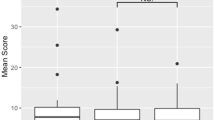Abstract
Neuropsychological impairment affects 40–65% of multiple sclerosis patients, mainly involving speed in information processing, attention, executive functions and memory. Deterioration occurs over time independently from disability and seems to correlate particularly with magnetic resonance imaging (MRI) atrophy measures. Studies on therapies effective in controlling cognitive impairment are scanty. We found that intensive and specific training of attention, information processing and executive functions is significantly effective in ameliorating both neuropsychological treated functions and in reducing depression. Preliminary functional MRI data suggest that possible neural correlates of this neuropsychological training could be an exercise-induced activation of prefrontal and cingulate cortices.

Similar content being viewed by others
References
Rao SM et al (1991) Cognitive dysfunction in multiple sclerosis. I. Frequency, patterns, and prediction. Neurology 41(5):685–691
Rao SM et al (1991) Cognitive dysfunction in multiple sclerosis. II. Impact on employment and social functioning. Neurology 41(5):692–696
Benedict RH et al (2009) Memory impairment in multiple sclerosis: correlation with deep grey matter and mesial temporal atrophy. J Neurol Neurosurg Psychiatry 80(2):201–206
Fisniku LK et al (2008) Gray matter atrophy is related to long-term disability in multiple sclerosis. Ann Neurol 64(3):247–254
Houtchens MK et al (2007) Thalamic atrophy and cognition in multiple sclerosis. Neurology 69(12):1213–1223
Rovaris M et al (2008) Cognitive impairment and structural brain damage in benign multiple sclerosis. Neurology 71(19):1521–1526
Chiaravalloti ND, DeLuca J (2008) Cognitive impairment in multiple sclerosis. Lancet Neurol 7(12):1139–1151
Patti F (2009) Cognitive impairment in multiple sclerosis. Mult Scler 15(1):2–8
Thomas PW, Thomas S, Hillier C (2007) Psychological interventions for multiple sclerosis (review). In: The Cochrane Collaboration. Wiley, New York, pp 1–51
Benedict RH et al (2000) Neuropsychological counseling improves social behavior in cognitively-impaired multiple sclerosis patients. Mult Scler 6(6):391–396
Jonsson A et al (1993) Effects of neuropsychological treatment in patients with multiple sclerosis. Acta Neurol Scand 88(6):394–400
Plohmann AM et al (1998) Computer assisted retraining of attentional impairments in patients with multiple sclerosis. J Neurol Neurosurg Psychiatry 64(4):455–462
Solari A et al (2004) Computer-aided retraining of memory and attention in people with multiple sclerosis: a randomized, double-blind controlled trial. J Neurol Sci 222(1–2):99–104
Crawford JD, McIvor GP (1985) Group psychotherapy: benefits in multiple sclerosis. Arch Phys Med Rehabil 66(12):810–813
Foley FW et al (1992) A prospective study of depression and immune dysregulation in multiple sclerosis. Arch Neurol 49(3):238–244
Rigby SA et al (2003) Development and validation of a self-efficacy measure for people with multiple sclerosis: the Multiple Sclerosis Self-efficacy Scale. Mult Scler 9(1):73–81
Kurtzke JF (1983) Rating neurologic impairment in multiple sclerosis: an expanded disability status scale (EDSS). Neurology 33(11):1444–1452
Mattioli F et al (2010) Efficacy and specificity of intensive cognitive rehabilitation of attention and executive functions in multiple sclerosis. J Neurol Sci 288(1–2):101–105
Bhogal SK, Teasell R, Speechley M (2003) Intensity of aphasia therapy, impact on recovery. Stroke 34(4):987–993
Penner IK et al (2006) Therapy induced plasticity of cognitive functions in MS patients: insights from fMRI. J Physiol Paris 99:455–462
Mattioli F et al (2009) Cognitive training in MS: an fMRI study. J Neurol 256(2):S240
Conflict of interest
The authors declare that they have no conflict of interest.
Author information
Authors and Affiliations
Corresponding author
Rights and permissions
About this article
Cite this article
Mattioli, F., Stampatori, C., Bellomi, F. et al. Neuropsychological rehabilitation in adult multiple sclerosis. Neurol Sci 31 (Suppl 2), 271–274 (2010). https://doi.org/10.1007/s10072-010-0373-7
Published:
Issue Date:
DOI: https://doi.org/10.1007/s10072-010-0373-7



